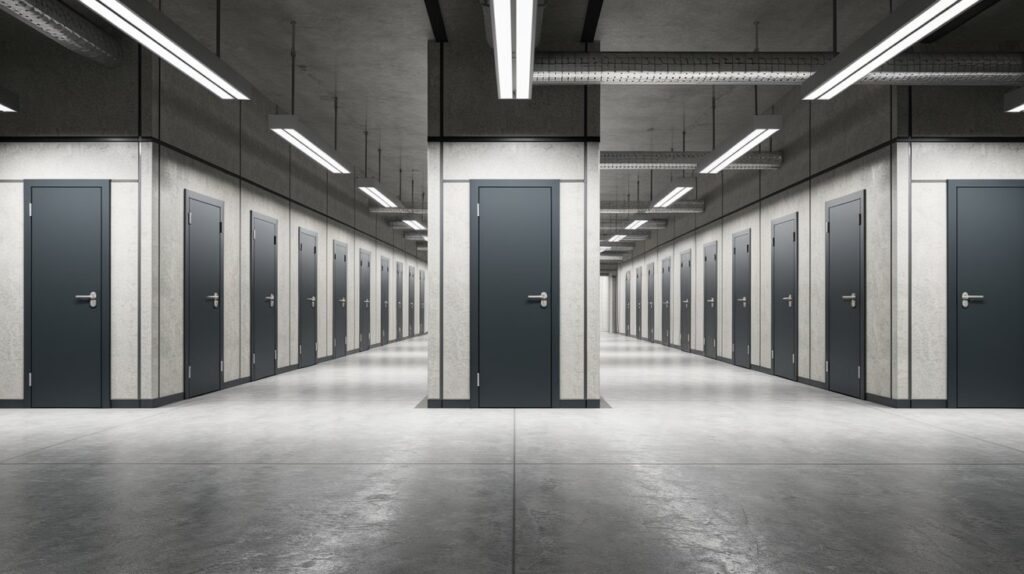Any commercial building with systems hidden behind walls or ceilings needs specialty access doors. This includes mechanical rooms, electrical panels, plumbing systems, and fire-rated walls. These doors are essential for maintenance and compliance.
Choosing the right door for each area can be challenging, but it’s an important step for long-term efficiency. The wrong access door can lead to frequent repairs, security vulnerabilities, or even compliance issues that result in fines.
Specialty access doors solve this by providing secure and durable access points designed for the unique needs of a building’s essential infrastructure.
Why Do Specialty Access Doors Matter in Commercial Properties?
Specialty access doors provide safe, efficient, and compliant access to a building’s hidden systems without damaging the surrounding structure. They simplify maintenance, saving time and money on routine checks and emergency repairs.
From a compliance standpoint, these doors are built to meet strict building codes, such as fire ratings. Specialized security access doors protect property and items from unauthorized access.
Aesthetically, these access doors can be designed to blend into the walls, keeping a clean look while remaining fully functional.
For contractors, using the right access door prevents costly mistakes, makes inspections smoother, and contributes to a project’s overall success.
Where Do Specialty Access Doors Provide the Most Value in Commercial Buildings?
Mechanical Rooms: Heavy-Duty and HVAC Access
Mechanical rooms are central to commercial buildings. They house systems like HVAC units, boilers, and chillers. These large systems need frequent service. As such, the access doors must be heavy-duty, insulated, and wide enough for easy entry.
They need to be durable to handle regular use and insulated to help with temperature control and energy efficiency. For example, HVAC access doors are crucial for cleaning ductwork and changing filters.
Without proper access, these maintenance tasks would be extremely difficult. For mechanical rooms, always choose doors with gaskets. These seals prevent air leaks, keeping HVACs and other systems efficient and a building’s energy performance high.
Electrical Panels and Equipment: Secure Access
Exposed wiring and electrical equipment are dangerous, so specialty electrical access doors are necessary to keep everything secure. These doors provide controlled entry to electrical infrastructure while protecting it from outside elements and unauthorized people.
Key features to look for include:
- Tamper-resistant locks
- Code-compliant designs
- Fire ratings if the panel is in a fire-rated wall
These panels are typically installed over panel boards, in utility rooms, and on ceiling-mounted conduits to keep a building’s power supply safe and organized. Using them helps electricians meet NEC standards, which reduces liability and improves safety.
Plumbing Systems: Moisture-Resistant Access
Plumbing systems are often hidden behind walls in places like bathrooms, kitchens, and utility chases. Specialty plumbing access panels provide quick and easy access to shut-off valves, clean-outs, and pipes for routine and emergency work.
These panels are designed to resist moisture and corrosion. They allow immediate access during a leak and simplify routine checks without tearing into the wall.
To save time on emergency repairs, install these panels in easy-to-find locations directly over key points like main shut-off valves. This simple step can prevent a small leak from becoming a major problem.
Fire-Rated Walls and Ceilings: Compliant Access
Fire-rated access doors are mandatory in commercial buildings. They are legally required to maintain the fire resistance of fire-rated walls and ceilings. They are used in key areas like stairwells and corridors to stop fire and smoke from spreading for a set period, creating an escape path for people and limiting damage.
These doors have specific features, including self-closing mechanisms, fire-resistant cores, and smoke seals, all of which help contain fire. They allow necessary access to hidden systems while keeping the structure’s fire rating intact.
Always check for UL and ASTM ratings to ensure the door meets your project’s fire-rating standards. Using unrated doors can lead to failed inspections and serious fire risks.
What Other Specialty Applications Should Contractors Consider?
Contractors should also consider other specialty access doors that fit a building’s needs. These include:
- Recessed access panels are ideal for high-visibility areas like lobbies, where you want a seamless look. These allow you to infill the panel with the same finishing material as the surrounding wall.
- Roof access hatches are essential for servicing rooftop HVAC units or any items housed on the roof.
- Security access doors are designed for restricted areas, such as data centers.
- Exterior insulated access panels prevent heat loss in energy-efficient buildings.
- Specialty finishes on access doors, like custom paint, can ensure they match the interior design of places like hotels and modern offices.
How Do You Choose the Right Specialty Access Door?
Choosing the right specialty access door means balancing function, code compliance, and aesthetics. Contractors need to consider a few key things:
- Fire Rating: The required fire rating ensures the door maintains the fire integrity of the surrounding wall, which is essential for containing fires and protecting building occupants.
- Material: The material choice determines the door’s durability, resistance to corrosion, and suitability for the environment, whether it’s a humid restroom or an outdoor utility space.
- Location: Unlike interior panels, exterior panels are affected by weather, sunlight and other temperature changes. They require weatherproofing and insulation to perform effectively in their specific environment.
- Size: Correct sizing provides adequate access for maintenance and repairs while ensuring the door fits into the wall or ceiling structure.
- Security features: These are great for protecting sensitive equipment from tampering and theft.
The goal is to choose a door that meets all building codes and withstands the building’s long-term demands.
Conclusion
Every part of a commercial property, from the mechanical room to fire-rated walls, needs a specialty access door for durability and compliance.
For contractors, picking the right door is an important decision that improves security, ensures compliance, and boosts efficiency.
The right access door is more than a simple open-and-close panel. It’s a specialized product, with features chosen for its purpose and where it’s installed.

